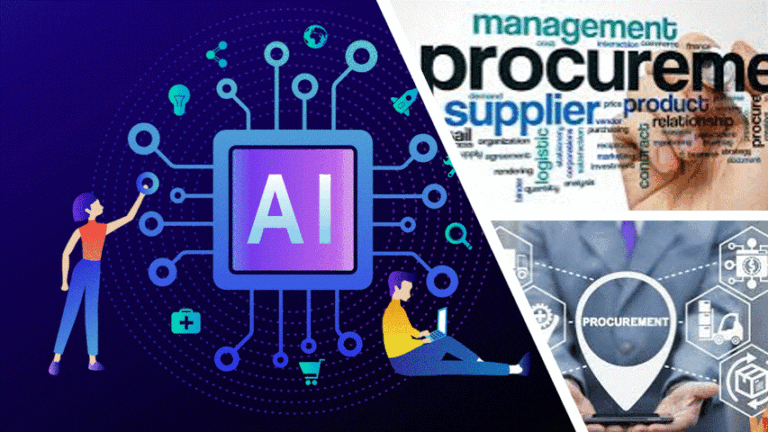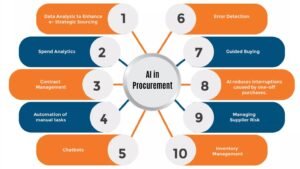
The Role of AI in Procurement: Maximizing Efficiency and Cost Reduction
Over the past few years, procurement has undergone a significant digital transformation, with artificial intelligence (AI) playing a key role. By leveraging AI, companies can achieve major benefits in procurement, including increased efficiency, cost reduction, and improved decision-making. Let’s explore how AI is transforming procurement.
AI in Data Management and Decision-Making
A major strength of AI in procurement is its ability to analyze massive amounts of data. With access to extensive external data sources, AI provides real-time insights that help procurement teams make informed decisions. By organizing complex datasets, AI enables powerful predictive analytics, projecting future outcomes based on historical patterns. This allows procurement teams to react proactively rather than reactively, leading to improved overall performance.
Increasing Productivity with AI
One of AI’s most impactful benefits is automating repetitive tasks. Instead of spending hours on manual processes, procurement teams can use AI to complete these tasks, saving time and boosting productivity. In fact, AI can reduce time spent on procurement processes by up to 60%, allowing teams to focus on more strategic, value-added tasks.
For instance, AI-powered systems can run 24/7, handling routine processes such as invoice processing, order tracking, and supplier communication. This kind of automation leads to smoother operations and allows procurement professionals to direct their attention to areas that require human expertise, such as strategic planning and relationship management.
Achieving Cost Reduction with AI
AI offers impressive cost-saving potential in procurement. By conducting detailed spend analysis and optimizing supplier relationships, AI can help reduce procurement costs by as much as 40%. The ability to quickly analyze supplier contracts, compare pricing models, and assess risk factors means that procurement teams can make more cost-effective decisions.
Moreover, AI can lower administrative costs by automating tasks like technical support through chatbots. This reduces the need for manual intervention in simple processes, which significantly cuts down on processing costs.
Improving Quality and Reducing Errors
Automation through AI not only enhances productivity but also improves the quality of procurement operations. By reducing the number of manual tasks, AI minimizes the risk of human error, ensuring more consistent standards of quality. This is particularly important in areas like order accuracy, supplier compliance, and returns analysis.
AI can also help identify recurring issues in procurement processes, allowing teams to address underlying problems and enhance the overall quality of supply chain management.
Enhancing Security in Procurement

Another advantage of AI in procurement is its ability to bolster security. AI-powered tools can help procurement teams select reliable suppliers, reducing risks associated with late payments, fraud, or poor-quality goods. AI can also improve contract management by automatically flagging any discrepancies or issues, ensuring better legal protection for the company.
By analyzing past supplier performance and market data, AI can also predict potential risks, enabling teams to make proactive decisions that safeguard the company’s interests.
Boosting Competitiveness through AI
AI’s capacity to streamline procurement processes, reduce costs, and improve quality ultimately makes companies more competitive. By operating more efficiently and offering better value to customers, businesses can gain a competitive edge in the marketplace. With AI, companies can adjust to market demands faster, delivering products at more competitive prices without sacrificing quality.
This enhanced operational efficiency can lead to higher sales and improved profit margins, helping businesses stay ahead of their competitors.
Successful AI Implementation in Procurement

While AI offers immense potential, successful implementation requires careful planning. Companies must first identify areas within procurement that would benefit most from AI, such as supplier management, order processing, or spend analysis. Organizing relevant data and ensuring proper training for procurement teams are also crucial for the smooth adoption of AI solutions.
Equally important is clearly communicating the benefits of AI to the team. By highlighting how AI will make their tasks easier, rather than replacing their roles, companies can foster a more positive attitude toward the changes.
Conclusion
AI is revolutionizing procurement by providing real-time insights, automating tasks, reducing costs, and improving quality. When implemented strategically, AI not only enhances operational efficiency but also boosts a company’s competitiveness. For organizations looking to stay ahead in today’s dynamic business environment, embracing AI in procurement is a clear path toward long-term success.
If your company is ready to harness the power of AI, start by identifying key areas for improvement and preparing your team for this technological transformation. With the right approach, the benefits of AI will soon become evident across the entire procurement process.